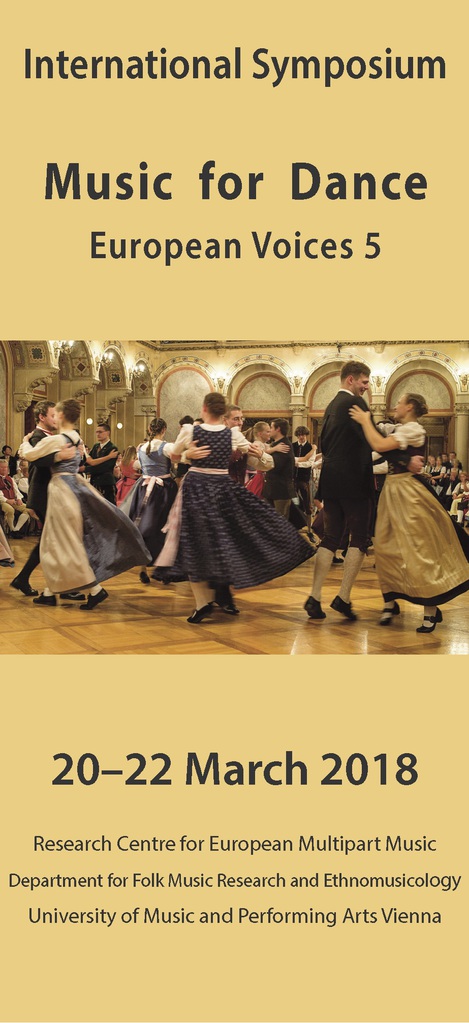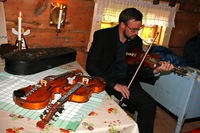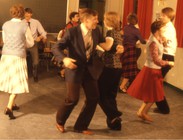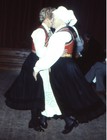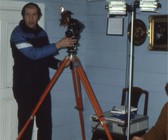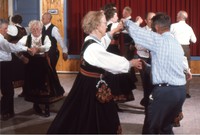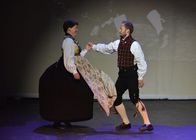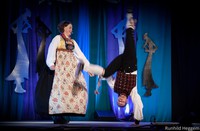Abendveranstaltungen
Musik und Tanz aus Norwegen
Dienstag, 20. März 2018, 19:00-20:30 Uhr
mdw-Universität für Musik und darstellende Kunst Wien
1030 Wien, Anton-von-Webern-Platz 1, Haydn-Saal
Freier Eintritt.
Unterstützt von der Botschaft des Königreiches Norwegen
Tanz: Anna Gjendem, Sigurd Heide, Stian Ronald (und Gesang), und Siri Mæland.
Hardangerfiedel: Jan Beitohaugen Granli.
Einführung und Moderation (in englischer Sprache): Egil Bakka.
„Dieser Abend widmet sich Tanz und Musik, aufgeführt von in Norwegen sehr aktiven Interpretinnen und Interpreten.
Ein besonderer Fokus der Darbietung liegt unter anderem auf den Paartänzen springar, pols und gangar, welche in ihrer Vielfalt die ältesten und nach wie vor am stärksten vertretenen traditionellen norwegischen Tanz- und Musikgenres ausmachen. Statt eines vorgefertigten Programmes entsteht die dynamische Abfolge der Tänze im Laufe des Abends.
In vielen norwegischen Gegenden, sind die lokalen Tanzversionen eng mit lokalen musikalischen Eigenheiten verbunden. Spezifische regionale Beziehungen zwischen Tanz und Musik werden während des Abends hervorgehoben.
Zudem erinnern manche Tanzformen überraschenderweise stark an österreichische Tänze. Im Besonderen weisen einige springar-Formen bemerkenswerte Ähnlichkeiten mit dem österreichischen Ländler auf. In beiden Ländern gibt es auch Männertänze mit vergleichbaren Merkmalen. Die Hauptidee des halling, welcher an diesem Abend selbstverständlich aufgeführt wird, entspricht beispielsweise jener der Schuhplattler.
Da die Wechselbeziehung zwischen Ausführenden und Publikum eine besondere Spezialität der norwegischen Tanzgruppe ist, wird das Publikum bei einigen leicht erlernbaren Tänzen zum Mitmachen eingeladen.“
Egil Bakka
Anna Liv Skjelten Gjendem is a young, modern dancer from Molde with a solid grasp of the local dance traditions. She has a bachelor’s degree in Traditional Dance Performance (NTNU/Ole Bull Akademiet) and a master’s degree in Traditional Arts from Telemark University College. In addition to her position as Head of the Folk Music Archive for Møre og Romsdal, she works full time as a dance teacher and performing traditional dancer. She is also a part of Hildur Dansekompani, which creates artistic productions based on folk dance and music traditions from central Norway. Another project she is involved in is the group Særsvip, where she dances together with a fiddler and reed organ player. Gjendem is passionate about presenting local dance traditions in both time-honoured and innovative ways.
Jan Beitohaugen Granli (1980) has played the hardanger fiddle since he was seven years old. During the first twelve years he learned to play the instrument in the usual way with a single teacher in his birthplace Valdres. Then he studied the hardanger fiddle for four years at colleges in Telemark and Voss.
Jan Beitohaugen Granli has been teaching the hardanger fiddle since 1997, and later also the jews-harp and hallingdansen. Since 1991 he has attended local and national competitions for the hardanger fiddle, and last summer he became Norwegian champion for the 6th time.
The main focus of his activity is performing for dancers.
Sigurd Johan Heide is the artistic leader of the dance company Kartellet. He holds an MA in Choreography from Oslo Academy of the Arts, and a BA in Ethnochoreology from the Dance studies program at the Norwegian University of Science and Technology.
Sigurd Johan Heide has been the project leader of Bygda dansar – “Snu nordvest” and “Lea de” for teaching traditional dances (2004-2010). In 2010 he won the Kings Trophy at a national competition for traditional music and dance and also did the choreography for the Day of the Dance in Denmark 2014.
Sigurd Johan Heide and the dance company Kartellet won the Norwegian dance critics’ award for dance for 2015/2016, and Troms County’s Culture Award in the same year.
Egil Bakka, professor emeritus of Dance Studies, Norwegian University of Science and Technology, Trondheim, Norway, (active 1989-2014). He directed the Norwegian Centre for Traditional Music and Dance from 1973-2013, where he built up an archive of traditional music and dance from all Norwegian counties. He chaired or participated in many research projects in national and international organisations and worked with UNESCO on the Intangible Cultural Heritage. He built up a full local program in Ethnochoreology and, in cooperation with six other universities, two international master’s programs which he coordinated. His latest publications include: "Theorizing and De-Theorizing Dance." Studia Choreologica 18/2017, 223-240; “Safeguarding of intangible cultural heritage. The spirit and the letter of the law.” Oslo: Musikk og Tradisjon. Novus forlag. 2015. 135-170; “Class dimensions of dance spaces: situating central agents across countries and categories.” In Nordic Dance Spaces. Eds. Vedel, K. and P. Hoppu. Farnham: Ashgate 2014. 129-158.
Siri Mæland has been a dancer, lecturer and convener specialised in Traditional Dance and Dance Analysis at the Sff, Norwegian Centre for Traditional Music and Dance in Trondheim since 2001. She supervises the revival movement, generates ethnopedagogy and dance analysis, works with the dance archive, and has been a lecturer and education manager of the BA degree in Ethnochoreology and the pilot BA programme for Traditional Dance Performance at the Department of Music, Norwegian University of Science and Technology (NTNU). She holds an MA in Ethnochoreology/Ethnomusicology and is about to finish her PhD thesis.
Stian Roland is Head of the Department for Traditional Art and Folk Music, University College of Southeast Norway (HSN). He comes from Valdres, an area steeped in tradition with living traditions in both folk dance and folk music, and holds a master’s degree in Traditional Art at HSN, specializing in the reconstruction of Norwegian dance and dance music. He has also pursued Dance Studies at NTNU and taken a performance-based course in folk song at the Ole Bull Academy.
Stian Roland has worked extensively in talent development and the dissemination of folk dance and folk music in Norway – among others as a project manager and instructor at the Norwegian Centre for Folk Music and Folk Dance in Trondheim, and as director of the Jørn Hilme-stemnet folk music festival. He has also worked on the research and dissemination of knowledge about Norwegian folk costumes at the Norwegian Institute of Bunad and Folk costume. Often used as a competition judge and instructor, he has also contributed to numerous performances as a choreographer or dancer.
Norwegian national champion for couple dancing: 2005, 2015, 2016.
Singing competition: 2nd place in 2010 and 3rd place 2014.
Received a Norwegian arts council grant in 2014.
"Dans Bonde på Jørn Hilme- stemnet 2010"
http://www.youtube.com/watch?v=0IbWp7jCLnM
"Springar på Jørn Hilme- stemnet 2013"
http://www.youtube.com/watch?v=fQIJ05s8MgU
